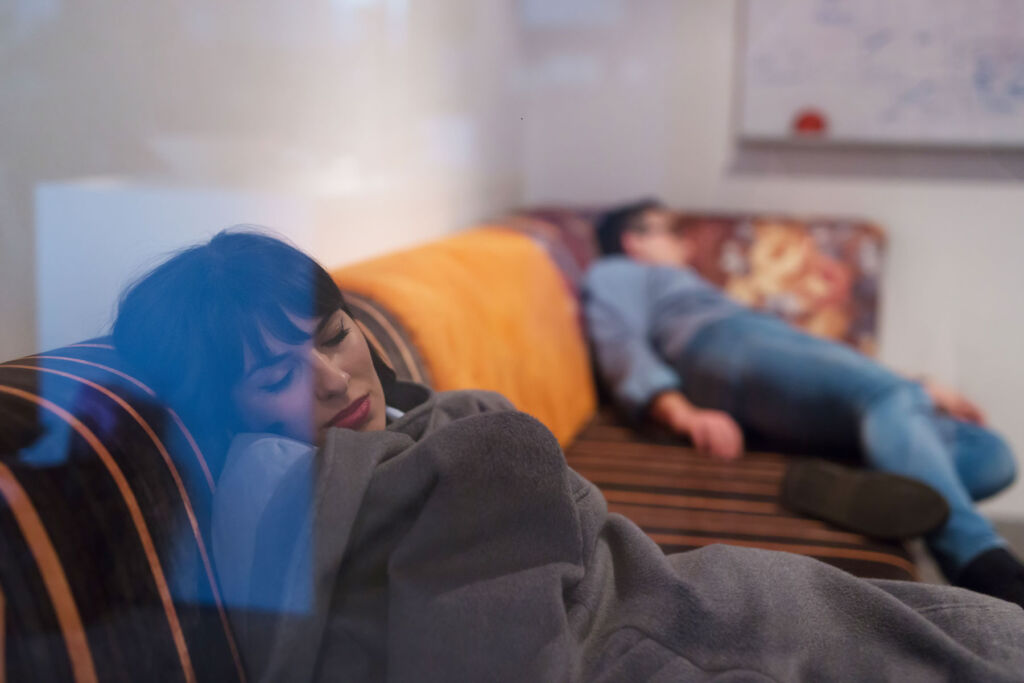
We are always keen to learn methods and techniques that result in a good night’s sleep. Something that we were not very familiar with is called Sleep Syncing, and we were eager to learn more about it. Fortunately, sleep expert Martin Seeley has written a guide for us that explains everything.
Sleep syncing is a term that can have different meanings, but generally, it refers to aligning your sleep schedule with your natural circadian rhythms or with the sleep patterns of others.
The circadian rhythm, otherwise known as your sleep-wake cycle, is your internal body clock, which follows a 24-hour cycle and is influenced by many internal and external factors as well as light and dark. It helps to control hormone release, such as melatonin and helps your body maintain a good routine.
Sleep syncing is when you create a routine that ensures your body sleeps and wakes when it should, giving your internal clock a gentle nudge. Sleep syncing can help improve sleep quality, increase energy levels and help to maintain a healthy body.

What are the more specific benefits of sleep syncing?
- Improved sleep quality: When you sleep in sync with your natural circadian rhythm, you are more likely to experience deep, restorative sleep. This can help you wake up feeling refreshed and alert rather than groggy and lethargic.
- Increased energy and productivity: When you are well-rested, you are more likely to have the energy and focus you need to tackle daily tasks. This can help you be more productive and efficient throughout the day.
- Better mood and mental health: Poor sleep is associated with a range of negative emotions, including irritability, anxiety and depression. You can improve your mood and mental well-being by syncing your sleep schedule with your body’s natural rhythms.
- Improved relationships: If you are sharing a bed or living space with others, syncing your sleep schedules can help ensure that everyone is well-rested and less likely to experience conflicts or irritability due to sleep deprivation.
Sleep syncing can be an effective way to improve your sleep quality and overall well-being. However, it is important to note that everyone’s circadian rhythms and sleep needs are different, so what works for one person may not work for another.
Finding the sleep schedule that works best for you may take some trial and error.
Here’s how you can do it:
Establish a consistent sleep schedule
Try to go to bed and wake up at the same time every day, even on weekends or days off. This can help regulate your body’s internal clock and make it easier to fall asleep and wake up naturally.
Get natural sunlight in the morning
Waking up to natural light can be a great way to wake up. This notifies our circadian rhythm that it’s time to get up. During the darker mornings, getting up can become increasingly more difficult, with the lack of light making it hard to wake up our internal body clock (circadian rhythm), and you may find that your brain wants you to wake up, but your body doesn’t.
These SAD lamps essentially replicate sunlight and are an effective way to add some light when it’s dark outside to help you stay motivated and boost your energy and mood. You’re more likely to experience cognitive benefits such as improved concentration and memory when you wake up from light rather than sound, such as an alarm.
Furthermore, it has been noted that increased light in your home helps to improve your overall well-being and increase energy and productivity.

Avoid caffeine in the afternoon
Find yourself drinking excessive coffee during the day and then struggling to sleep at night. You may need to reduce your caffeine intake. Drinking too much caffeine too late in the day can leave you feeling wired well into the evening, and whilst this may be useful if you are heading to the gym or have evening plans, you may find it harder to drift off to sleep when it’s bedtime.
Try to reduce the amount of coffee you have each day, and ensure your last one is early afternoon, so the caffeine has time to leave your system before you head to bed. If you’re a bit of a coffee addict, you may want to switch to decaf so you can enjoy the flavour without all the caffeine.
Create a bedtime routine
During the winter months, you may find that your body needs more sleep compared to other seasons; this is because the lack of daytime sunlight can trigger your body to produce more melatonin, the hormone that makes you sleepy – so feeling tired earlier in the day is often common but completely normal.

Lean into this and if you need to have an extra hour of sleep each night, then embrace it and adjust your sleep routine accordingly, winding down earlier with a bath, a book, and meditation, create a relaxed sleep environment and get an earlier night’s sleep.
Changing your sleep routine and sleep habits to fulfil your body’s needs will help you to feel more energised during the day, and you may find that you are waking up in a better mood, ready to embrace the cooler, darker, yet beautiful winter’s day ahead.
Avoid bright light at night
Using your phone, laptop or iPad right before bed can harm your sleep hygiene and could promote disturbed sleep or interfere with your sleep quality. Exposure to bright light, especially from electronic devices, can disrupt your body’s production of the melatonin hormone, making it harder to fall asleep.
Avoid screens and bright lights for at least an hour before bedtime, and consider blackout curtains or an eye mask to keep your bedroom dark.

Get regular exercise
Exercise can help regulate your circadian rhythm and promote deeper, more restorative sleep. Just be sure to finish your workout at least a few hours before bedtime to avoid disrupting your sleep.
Make sure your bedroom is comfortable
Creating a sleep sanctuary and a place that will allow you to drift off into a deep sleep is super important to ensure we get that all-important REM sleep. Your bedroom is for sleep, so the furnishings and environment should reflect this. Ensure all electronics are removed, and it is cool, dark and quiet.
You should also ensure your room is free from clutter, as a messy room can often subconsciously make us feel stressed and anxious, which could promote migraine triggers. Try blackout curtains to ensure the room is dark enough. You may also want to light scented candles and even try a weighted blanket to help you feel comforted and relaxed.

Avoid napping
Napping throughout the day is one of the worst things you can do for your sleep cycle and can throw your routine completely off. Linked to “junk sleep”, which describes bad quality sleep, patchy sleep, napping can actually do more worse than good. By avoiding napping, you are also avoiding ‘lightmares’, which describe having daytime nightmares and have been linked to poor health.
To avoid junk sleep, the best thing you can do is get into a regular sleep routine and try your best to stick to it. So make sure you go to bed at the same time each night and that it is at a decent hour so not too late; make sure you are getting the right amount of sleep; 8 hours is advised. Avoid working late, drinking excessive alcohol or smoking.
You need to be strict with yourself at night, so if you are tired and feel yourself falling asleep on the sofa, get yourself up, wash and get into bed so you won’t be disturbed in the night.

Eat for your circadian rhythm
Circadian eating is a thing and means that you are eating during certain hours of the day so as not to upset your digestive system or cause sleep problems. Try to avoid eating heavy meals in the evening or late at night.
Ideally, it would be best if you were starting your day with a good breakfast to fuel you throughout the day, a substantial lunch and a lighter dinner. This will allow your body to be comfortable when it’s time to sleep.
By incorporating these strategies into your daily routine, you can sync your sleep schedule with your body’s natural circadian rhythm and improve your overall sleep quality.
Establishing a consistent routine may take some time, but with patience and persistence, you can create healthy sleep habits that work for you.
This guide was compiled by Martin Seeley, a sleep expert and the CEO of Mattress Next Day.
Read more health guides, news and the latest research here.
![]()




You must be logged in to post a comment.